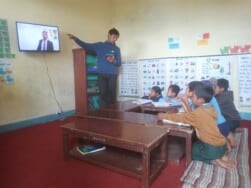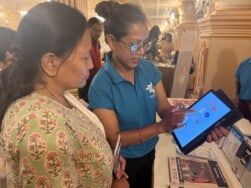Leveraging EdTech to Support Students with Disabilities in Nepal
September 18th, 2023 | News
An estimated 11 percent of children in Nepal have a disability, but few receive tailored learning support. Only about one percent of the country’s 34,000 schools serve children with disabilities expressly. And while information and communication technology (ICT) can facilitate learning for all children—especially those with disabilities—many lack access to technology at home and school. Teachers may prefer traditional teaching methods or be unprepared to integrate technology into curriculum, and some parents don’t believe that technology benefits learning.
Between February 2021 and June 2023, the Leveraging Existing Accessibility Resources in Nepal (LEARN) project integrated high- and low-tech materials into learning based on Universal Design for Learning (UDL) principles to meet the needs of children with disabilities. LEARN worked in 200 special, mainstream, and schools with resource classes across Nepal, reaching 26,350 children from diverse backgrounds; training 450 teachers; and orienting 480 school and community leaders to inclusive education and UDL principles. LEARN partners distributed more than 500,000 teaching and learning materials, including almost 300,000 EdTech resources, to schools.

The project also created a centralized collection of teaching and learning materials organized by subject. The materials, including more than 500 books in 10 local languages, disability-focused teaching tools, and radio messages for parental engagement, are all free and open source. The collection makes it easier for teachers to find specialized resources and increases interactivity by providing learning opportunities in a variety of formats.
LEARN worked with parents of children with neurodevelopmental disabilities to develop an app and mobilized volunteers to promote the use of Nepali Sign Language apps. The team increased the capacity of seven Nepali organizations of persons with disabilities to foster inclusive education, and transferred ownership of teacher training materials to the Government of Nepal, which committed to incorporating UDL principles more broadly in the education system.

At the end of the project, 100 percent of surveyed teachers reported using EdTech weekly, and 79 percent demonstrated three or more desired behaviors related to its use in the classroom. Additionally, learners who are blind or have low vision and who are deaf and hard of hearing showed statistically significant increases in language and literacy scores.
The LEARN project was funded through the UnrestrICTed Challenge of All Children Reading: A Grand Challenge for Development (ACR GCD). ACR GCD is a partnership between USAID, World Vision and the Australian Government.
World Education fosters enduring partnerships across regions and sectors to advance education outcomes for all. We offer education systems strengthening, program design and implementation, applied research and evaluation, capacity development, and policy development services.